- Home
- Neal Shusterman
The Shadow Club Rising Page 8
The Shadow Club Rising Read online
Page 8
"Tell me about that hat, Miss Lattimer."
Jodi was wearing her denim baseball cap—this time it was forward instead of backward. On the front in bright orange were the letters "TSC."
"What's to tell?" she said calmly. "My father belongs to the Tennis and Squash Center. We have a bunch of them."
It took me a second to realize what Greene was thinking, That "TSC" could also stand for The Shadow Club.
"Are you going to expel her because of the hat?" I asked.
He threw me a gaze meant to chill me. I knew he had scheduled me a parent conference for the end of the week. He was making all these noises about suspension and expulsion, and yeah, it bothered me—an expulsion followed you wherever you went—but Greene's X-ray gaze didn't intimidate me anymore, because I knew it wasn't going to see through anything.
There must be some fourth law of thermodynamics. Along with the law of conservation of energy, there must be some kind of conservation of oddity, keeping the world in balance. It only figured that as I began to resemble a mother's worst nightmare, someone else's act began to clean up.
I came home from school during that first week of theShaditude to find some strange kid rummaging through my refrigerator for food. One of Tyson's friends, I figured, which was bizarre, because Tyson never brought home friends. I didn't know he had any. I was about to ask if I could help him find something, then I remembered my Shaditude, and said, "You take something, you pay for it, dude."
The kid turned around to reveal a familiar face in an entirely unfamiliar package.
"Hi, Jared."
It wasn't a friend of Tyson's at all. It was Tyson himself. His hair, which had always been long and stringy, was cut short, with a smooth line along the back of his neck. He had even shaved those goat hairs on his neck that might someday become a beard.
"Uh . . . nice 'do," I said, still reeling from the sight. What's the word for something that's a total logical inconsistency? An oxymoron. Yeah, that's what Tyson was. "Tyson McGaw" and "clean cut" did not go together in the same sentence without causing a major short circuit—like the one I had now as I gaped at him. Actually, oxy-moron was a better description of me at that moment—a moron whose brain wasn't getting enough oxygen.
"You like it?" he asked, running his hand through what was left of his hair.
"Yeah, sure," I said, still wading through recovery. "It'll blow everyone away."
"Well," he said, "I figured if you could be your own evil twin, I could be my own un-psycho twin." He grabbed his jacket and headed for the door.
"You're off in a hurry," I said, and laughed. "What, have you got a date or something?" I meant it as a joke, but Tyson wasn't laughing.
"As a matter of fact, I do."
Right about now, the signpost up ahead was beginning toread "The Twilight Zone," but I couldn't exactly say why Yes, you can say why, my get-real voice told me. It's because Tyson is Tyson and the earth spins out of orbit if he suddenly has friends and short hair and a girlfriend and—
"Who's the lucky girl?"
"Jodi Lattimer."
"No way."
"Yeah—we're going out to Dairy Queen for some ice cream, and just to hang out, y'know."
"That's not exactly a date," I informed him, even though I knew it technically was.
He shrugged. "Call it whatever you want."
Then I noticed something else about him. He was wearing one of my shirts.
"Who gave you permission to put that on?" This time it wasn't Shaditude—it was all me.
"Well, you're not wearing your old stuff anymore."
"It doesn't fit you anyway, it just hangs on you on account of you don't have any pecs."
Tyson took it as an insult, which I suppose it was. "I got pecs!" he said, pushing out his chest. "I've been working out—I've got pecs up the wazoo!"
The fact that, yes, my shirt actually did fit him wasn't really the point. I wasn't exactly sure what the point was, only that I was truly annoyed.
Then something struck me, and suddenly Tyson looked all different to me again.
"How long have you been wearing my shirts?"
He shrugged. "I tried one on yester—" And his face changed again, like he was a regular chameleon, the minute he realized why I was asking. He thought for a moment, his face going granite hard, his lips pursing into a tight little hole in his face. "Well, of course, there was the time last week when I wore your shirt and popped a button on Alec Smartz's driveway. Nobody knew but me and the skunk."
Sometimes—not often, but sometimes my brain turns into Play-Doh, and I find my mouth opening and closing as I try to squeeze an intelligent thought through the doh-matic press.
"Duh . . . Are you serious? You're not serious, right? Are you kidding? Was that a confession? You're kidding, right?"
Tyson shook his head. "If you have to ask, then you don't deserve an answer."
And he left, leaving me on the doorstep to press my Play-Doh.
By the next day I had reached the inevitable conclusion that Tyson was just being Tyson, and probably had nothing to do with the button. At first I wondered how he even knew about it, but by now everyone knew about that button. Still some residual suspicion remained, like the smell of bug spray in the summer. One minute I was suspicious of him, and the next I felt all guilty about feeling that way.
Between classes, I found Jodi Lattimer at her locker. I approached her as though I was just making friendly conversation, but I had a reason for looking for her. Two reasons, actually.
"Hi, Jodi," I said.
"Hi, Jared."
"So . . . I hear you and Tyson went to the Dairy Queen."
"Yeah," she said as if it was nothing. "And next week we're going to the movies."
"Good," I said. "That's great. So you actually like him."
"Yeah. Is that so hard to believe?"
"No, not at all." Now this was getting awkward. "It's just . . . it's just that Tyson's been through a lot, y'know. I just don't want to see him hurt."
"Sounds like you're jealous."
Well, maybe I was and maybe I wasn't. I hadn't quite sorted that out yet, but I was pretty certain that jealousy—if there was any—was secondary to my genuine concern for Tyson. At least the concern I felt when I wasn't feeling suspicious of him. Anyway, the last thing Tyson needed was a game of hormonal tetherball with a girl who took it too lightly.
"Just don't toy with him, OK?"
"What, are you his father now?"
"He doesn't have a father—in case you didn't know."
"So I've heard."
This wasn't going well, but before we escalated into the "fine-be-that-way" mode, Jodi disarmed.
"Listen . . . Tyson can take care of himself," she said. "And he does it pretty well." Then she looked me over. "Nice clothes," she said, in a way that made it completely unclear whether she liked my new clothes, or whether she was just being sarcastic.
"Yeah, well, it's a look," I said. "Anyway, Tyson's not the reason why I wanted to talk to you. I wanted to see if I could get your hat."
"My hat?"
"Yeah," I said offhandedly, trying to hide how much I really wanted it. "It's kind of cool."
"Why don't you just go to the Tennis and Squash Center and get your own?"
I pulled a bill out of my pocket. "I'll give you ten dollars for it."
"Suit yourself." She took my money, pulled the hat from her head, and handed it to me. I suppose ten bucks warranted no questions asked. Or maybe she just didn't care.
Regardless, anyone who saw me wearing the hat, even if they knew where it really came from, would know what TSC meant for me. It was exactly what I needed to make my bad kid illusion complete.
For lunch that day I didn't go out to Solerno's, I stayed in the cafeteria. I positioned my TSC hat just right, then I found a kid who wouldn't give me any trouble, and just pushed my way in front of him in line.
"Hey!" he complained.
I turned to him and stared. "You got a proble
m?"
He backed down and said nothing.
Quite a few kids noticed my behavior, and I took note of which kids were intimidated, which kids were annoyed, and which kids suddenly seemed to gravitate toward me, impressed by my new mean image. During the next couple of days, it was those impressed kids that I made a point of nodding to, and giving a friendly rap on the shoulder as I passed by, like they were all my new best friends.
Mitchell Bartok, a kid so tough he must have worn leather diapers as a baby, made a point of sitting at my lunch table on the third day of the Shaditude. We bad-mouthed teachers together and said some rude things about various girls we saw around the cafeteria. I pretended that I knew something about Harleys, and suddenly he was telling me his life story. Then, as the lunch bell rang, I turned to him and said: "Hey, Mitchell, all that stuff you did to Alec was pretty funny."
But he looked at me cluelessly. "I thought you did all that stuff."
"Yeah . . . yeah sure," I said. "Just kidding you."
When he was gone I opened my notebook and crossed him off my list of suspects.
Each day, when I got home, I went straight into the bathroom and peeled off my new self, like a full body mask. Then I stepped into a hot shower and scrubbed myself, feeling dirty, but knowing that the worst dirt wouldn't come off with soap. All those nasty things I said and did to build my new false image, all the tricks I was playing on kids like Mitch Bartok to ferret out the truth. I guess what bothered me most was that everyone seemed to believe my bad-kid act. I mean, I'm not a great actor, but in this case it wasn't hard to become what they made me. And it scared me . . . because part of me liked it—just as part of me had liked the secret power I wielded as the leader of the Shadow Club, back when we were at our worst. And so each day I didn't stop scrubbing until I could find myself underneath, and remembered that I liked my real self a whole lot more.
And then there were my parents, who seemed to have invoked a ten-foot-pole policy with me. Not physical distance, but emotional. I knew that Greene was preparing for a big meeting with them next week—and yet my parents said nothing to me about that, or any of the things Greene must have been telling them. That scared me more than their House un-American Activities questioning. It's like they were so worried, they chose to stick their heads in the ground, and broke off all communication with me. I mean, what if I really was up to something terrible? How could they not get after me for the way I was acting—even if it was just an act? I could forgive my parents for prying too much, but it was harder to forgive them for not prying at all.
Jodi showed up at our house that Friday—the end of my first week of Shaditude. She walked in the front door like she owned the place—serves me right for leaving it open. I was lying on my bed, trying not to think of anything in particular. I used to be very good at that, but in recent months my thoughts were way too focused much of the time—usually on things I didn't enjoy thinking about. I was tossing that seashell of mine up into the air, trying to see how high I could get it without actually hitting the ceiling. My mom once told me it was a very "Zen" thing to do—whatever that means. With my headphones blasting music, a freight train could have come through the house and I wouldn't have known. Naturally, when I looked up and saw Jodi there at my bedroom door I was startled, lost my concentration and the shell came down, hitting me in the face. I took the headphones off and the blaring music became tinny and distant.
"I'm looking for Tyson," she said.
"He's not here," I told her. "I'll tell him you came by."
But she didn't go just yet. She glanced at the ballistic seashell that had done its damage and now lay innocently on my bed. "You're supposed to do that with a baseball, aren't you?" she asked. "Y'know—toss it up and down."
I shrugged looking at the shell. "Baseballs don't break."
"Isn't that the point?"
"I don't know," I said. "Where's the challenge if nothing's at risk?"
"Wow," she said. "Deep."
She looked around, never stepping into the room. I felt like I was under a microscope again. "See anything interesting?"
"Your room's not what I expected."
I looked around. My desk was a mess of schoolwork, but otherwise, the room was pretty neat. There was a poster of Carl Lewis bursting through an Olympic finish line, because I'm a runner; a poster of a Ferrari Testarosa, because I like cars; and a poster of supermodel Lorna LeBlanc because . . . well, just because. All in all, my room was nothing out of the ordinary.
"What did you expect?" I asked. "Pipe bombs and hate literature?"
"Nah, you're too smart for that," she said, and then added far too seriously for my taste, "You'd keep that stuffmuch better hidden." She glanced at the shell, which had found its way back into my fidgety hands. "So what do you hear when you put that thing to your ear, the sea?"
"I hear the voices of all the kids I had to kill, because they saw my room." I thought she might laugh at that, but she didn't give me so much as a chuckle. "Yeah," I told her, "I do hear the sea and it reminds me of all the bad stuff that happened in October."
"If it were me," Jodi said, "I'd never put it to my ear."
"I like being reminded," I told her, "so I'll never do it again." I could sense that she didn't really believe me, but I didn't care who believed me anymore. "If you're dating Tyson, why are you so interested in me?"
Jodi shrugged. "A few months ago you almost got him killed, yet now he talks about you like you're God at fourteen, so I guess I was just curious." She backed out of the doorjamb, preparing to leave. "Tell Tyson I stopped by," she said, and she pointed at my eye, which was still aching from where the shell hit. "And you better get some ice on that, unless a black eye is part of your new look."
After she left, I put the shell in a drawer instead of back on the shelf.
If it were me, I'd never put it to my ear.
Maybe she was right. I had a world full of reminders already. There were enough people looking back at what I had done. That was one club I didn't need to be a part of anymore.
Alec
Blows Up
I SHOULD HAVE been the town hero for what happened next, but when you're pegged, you're pegged, and if people want to, they can see the worst of intentions in the best of acts. I spent the next lunch period alone in the library. It was one of those cold windy days when few kids would brave the walk to Solerno's. Most everyone was down in the cafeteria, and that's not where I wanted to be. I didn't want to see Alec, didn't want to think about him, so I sat studying world history, idly wondering if it could teach me anything about how to avoid bad situations. Unfortunately, all history taught me was that bad situations tended to get worse and worse until an awful lot of people were dead.
That's when O. P. sort of staggered into the library. The worried look was plastered as prominently across her face as the campaign fliers in the hallways. She sat down across from me, not saying anything, waiting for me to ask the obvious question.
"What's up, O. P.?"
"Somebody slipped this into my backpack," she said, and handed me a piece of paper. Scrawled on it, in a handwriting I could barely read, were the words:
We're on your side.
"Who's 'we'?" I asked.
She shook her head. "I don't know . . . but that's not all." She looked around, like a spy about to hand me some crucial microfilm, and then flipped the paper over to reveal that the note had been scribbled on a medical form—the kind that the school nurse kept in her office for every student. This one has been filled out, and the name on the form was Alec Smartz.
"Someone gave you Alec's medical info?" I asked, not quite getting it.
"I don't know what it means," she said, looking more worried than the time she forgot to study for a science exam. "But I'm beginning to think that maybe you were right about things starting all over again . . . and that maybe this note wasn't meant just for me—maybe it was meant for the whole Shadow Club.
"But what does it have to do with Alec's medica
l record?"
O. P. just shrugged.
I read through Alec's medical form three times—like I said, I'm not that great with details—but on the third pass I caught it.
At first I refused to believe that anyone would stoop so low, but the more I thought about it, the more I realized that only one thing on that sheet of paper could be used against Alec. O. P. must have seen it in my face.
"What is it?"
I handed back the piece of paper, feeling the tiny hairs on my arms and legs begin to rise, even though the library was oppressively warm.
"Alec's allergic to penicillin."
I bolted out of there before I could see O. P.'s reaction, and raced down the hall, bursting down the stairwell, taking four steps at a time. I knocked a kid down as I crashed into the first-floor hallway. The cafeteria was at the far end, and us I ran toward it, putting all my speed and strength into my legs, I felt the same sense of futility I had four months earlier when I watched Austin Pace race barefoot toward a jagged pile of rocks lying in wait for him. Back then I knew I wasn't last enough to catch up with him, to stop him. That's exactly how I felt now.
I ran into the cafeteria door with the full force of my body. Someone caught behind the door yelped, but I never saw him. Instead I scoured the crowded room for Alec. He was in the far corner, surrounded by his close friends and bodyguards: an unlikely inner circle that ranged from the brawny likes of Moose SanGiorgio, to the weaselly Calvin Horner, who was responsible for Alec's nomination, and was probably the spy who took that video. Then I saw Alec reach for a bottle of orange soda. He had given up Dr Pepper, and anything that reminded him of it, for obvious reasons. He probably assumed drinking from a bottle was safer than from a cup—after all, anyone can mess with a cup—but was he cautious enough to listen for that telltale hiss as the soda was opened to make sure it hadn't been tampered with?

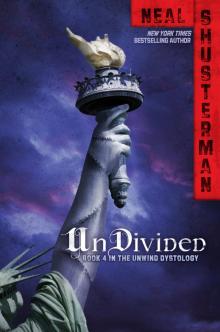 UnDivided
UnDivided UnBound
UnBound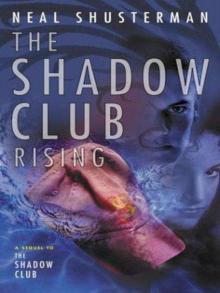 The Shadow Club Rising
The Shadow Club Rising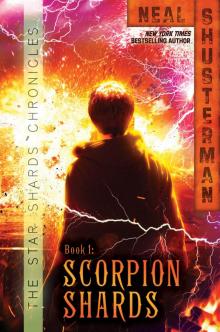 Scorpion Shards
Scorpion Shards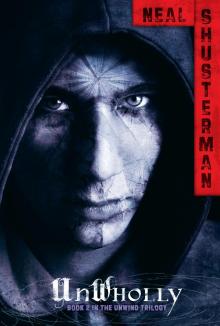 UnWholly
UnWholly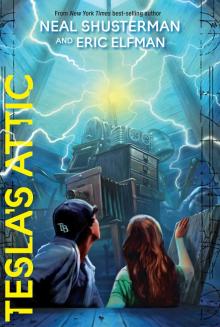 Tesla's Attic
Tesla's Attic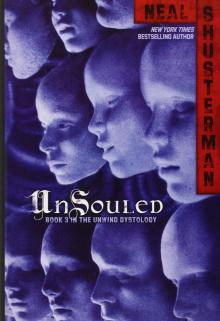 UnSouled
UnSouled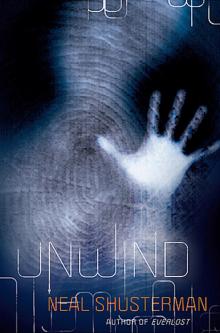 Unwind
Unwind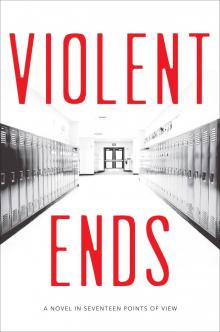 Violent Ends
Violent Ends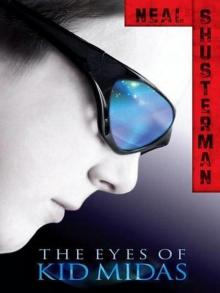 The Eyes of Kid Midas
The Eyes of Kid Midas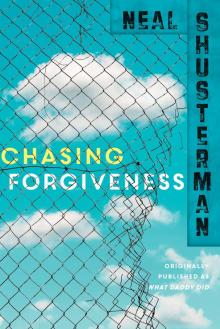 Chasing Forgiveness
Chasing Forgiveness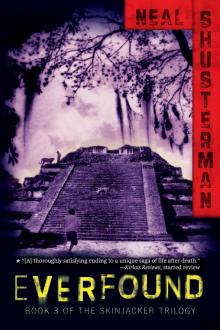 Everfound
Everfound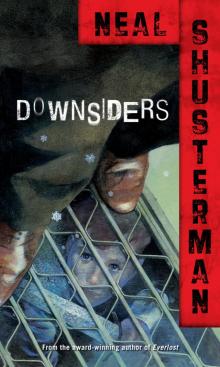 Downsiders
Downsiders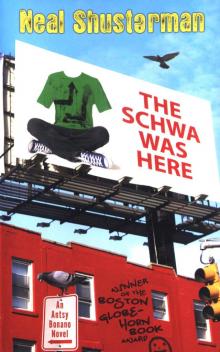 The Schwa Was Here
The Schwa Was Here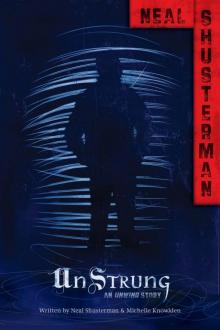 UnStrung
UnStrung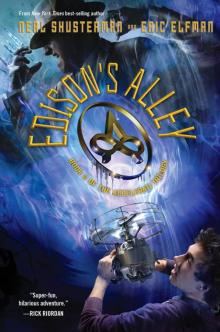 Edison's Alley
Edison's Alley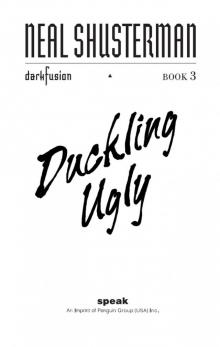 Duckling Ugly
Duckling Ugly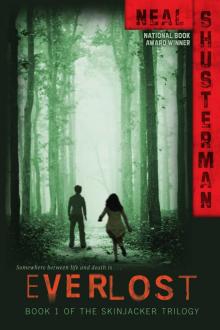 Everlost
Everlost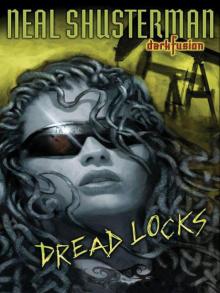 Dread Locks
Dread Locks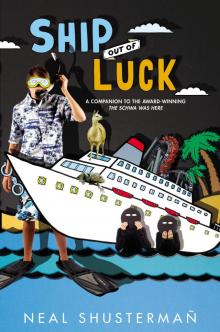 Antsy Floats
Antsy Floats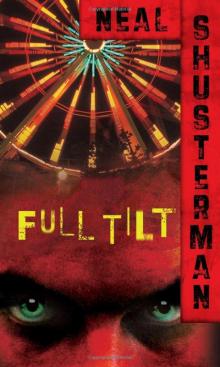 Full Tilt
Full Tilt Thunderhead
Thunderhead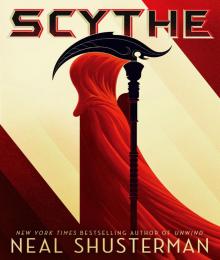 Scythe
Scythe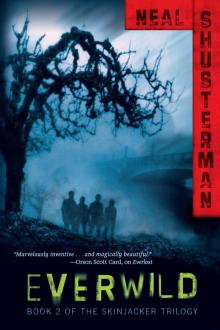 Everwild
Everwild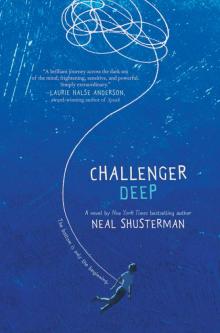 Challenger Deep
Challenger Deep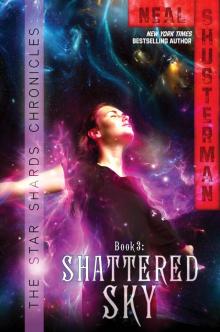 Shattered Sky
Shattered Sky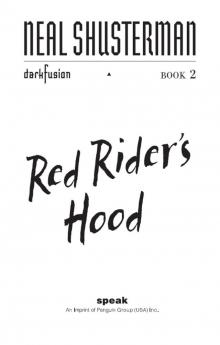 Red Rider's Hood
Red Rider's Hood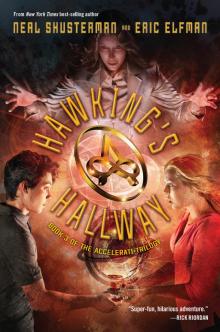 Hawking's Hallway
Hawking's Hallway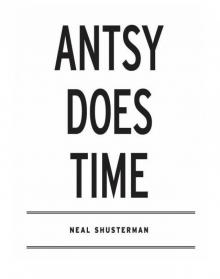 Antsy Does Time
Antsy Does Time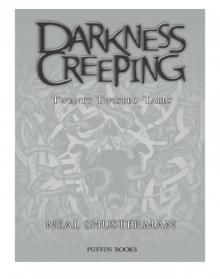 Darkness Creeping: Twenty Twisted Tales
Darkness Creeping: Twenty Twisted Tales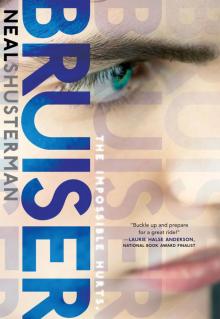 Bruiser
Bruiser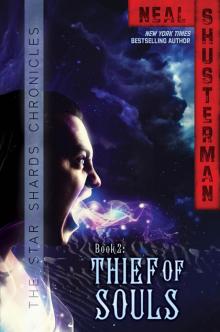 Thief of Souls
Thief of Souls The Toll
The Toll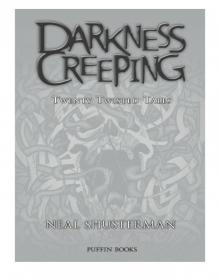 Darkness Creeping
Darkness Creeping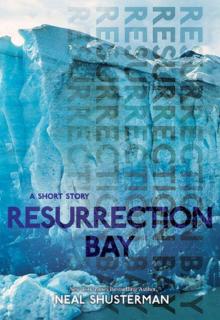 Resurrection Bay
Resurrection Bay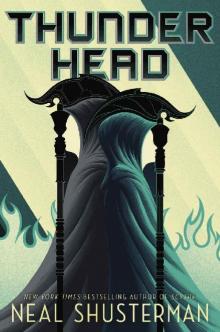 Thunderhead (Arc of a Scythe Book 2)
Thunderhead (Arc of a Scythe Book 2)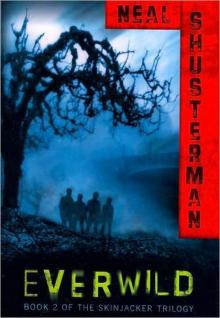 Everwild (The Skinjacker Trilogy)
Everwild (The Skinjacker Trilogy)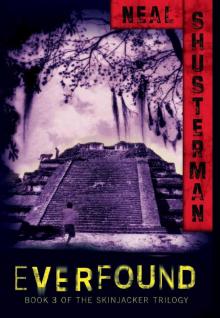 Everfound s-3
Everfound s-3 Edison’s Alley
Edison’s Alley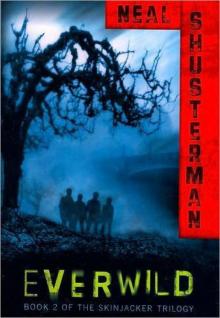 Everwild s-2
Everwild s-2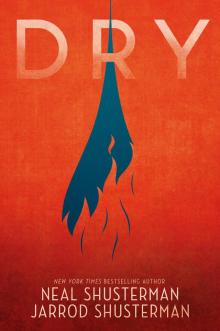 Dry
Dry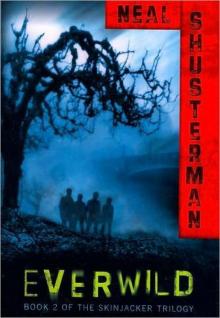 Skinjacker 02 Everwild
Skinjacker 02 Everwild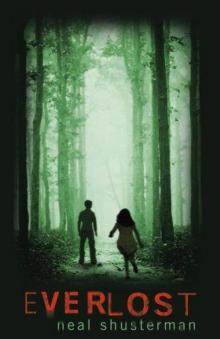 Everlost s-1
Everlost s-1